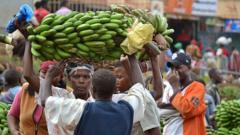The meeting between President Zelensky of Ukraine and President Ramaphosa of South Africa signifies a notable shift in diplomatic relations, as both nations aim to counterbalance the influence of Russia and mend ties with the United States, particularly under the scrutiny of Donald Trump's administration.
South Africa and Ukraine Forge New Ties Amid Global Diplomacy Challenges

South Africa and Ukraine Forge New Ties Amid Global Diplomacy Challenges
As Ukraine's President Zelensky visits South Africa, both nations seek to enhance diplomatic relations amidst shifting allegiances from global powers.
Ukraine’s President Volodymyr Zelensky is making headlines with his first official visit to South Africa, a move reflecting a significant shift in relations between the two countries that once faced strains. The visit represents a strategic effort by Zelensky to fortify Ukraine’s presence in Africa, an area where Russia has been rapidly expanding its influence, especially since its invasion of Ukraine in 2022. Steven Gruzd from the South African Institute of International Relations commented on the visit's implications, suggesting that "Russia will be annoyed," but may struggle to retaliate effectively.
Zelensky's visit is particularly crucial given the thawing of diplomatic ties with several African nations that have remained neutral in the conflict. As Ukraine has doubled its embassies in Africa from ten to twenty over the past three years, the need to cultivate these relationships has been made evident amid Ukraine's faltering relations with the U.S. since the Trump administration, which has directly impacted military aid provided to Ukraine. Political analyst Prof. Siphamandla Zondi noted, "Wars aren't only won on the battlefield but also in courts of public opinion around the world," emphasizing the importance of international diplomatic legitimacy for Ukraine.
On the South African side, President Cyril Ramaphosa is keen to engage with Zelensky, hoping to establish a narrative of South Africa as a peacemaker. Ahead of Zelensky's visit, Ramaphosa had an exchange with Russian President Vladimir Putin, affirming their existing bilateral relations. This dialogue follows Ramaphosa’s previous attempts in 2023 to mediate peace, an effort met with skepticism from the U.S. due to allegations of South Africa supplying arms to Russia—a claim that was later debunked by a judge-led inquiry.
Despite past controversies, the Trump administration's relations with South Africa have been mostly contentious, particularly over issues related to Israel and alleged injustices against the Afrikaner community. However, both nations are under pressure to navigate these alliances carefully; South Africa's engagement with Ukraine must not be perceived as a threat to its dialogue with the Trump administration, according to analysts.
As Ukraine seeks to bolster trade with South Africa, the potential for economic cooperation is seen as critical, especially given South Africa's economic struggles. Prof. Zondi remarked that a strengthened trade relationship between the two countries could provide Ukraine a foothold in Africa, with South Africa serving as an important access point due to its port infrastructures and financial systems.
Ultimately, while South Africa and Ukraine aim to enrich their partnership, they remain aware of the broader geopolitical complexities, especially regarding their relationships with Russia. According to Zondi, African nations necessitate strong ties with both Russia and Ukraine to ensure essential supplies, particularly cereals, that both nations export vividly to the continent. The developments of this visit could herald a new chapter in Ukraine-Africa relations, one that does not necessarily eliminate Russia from the equation.




















